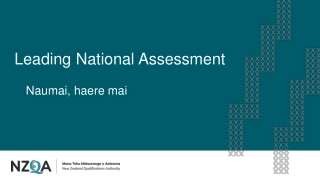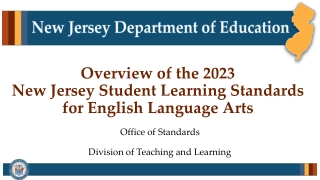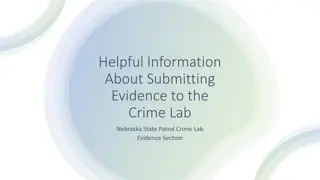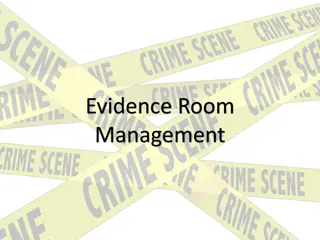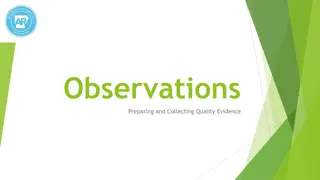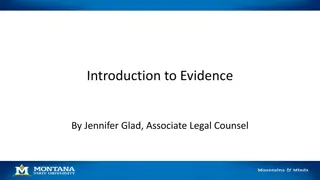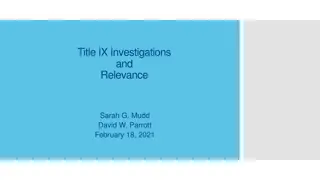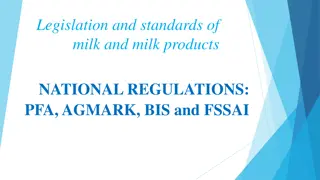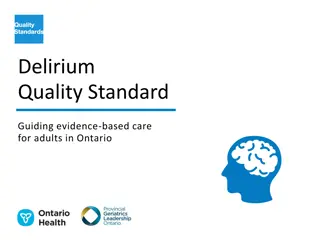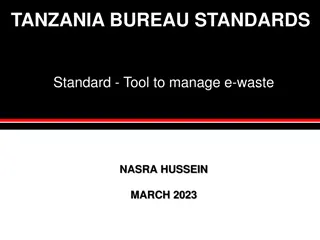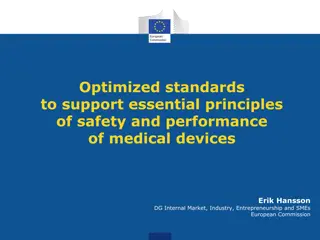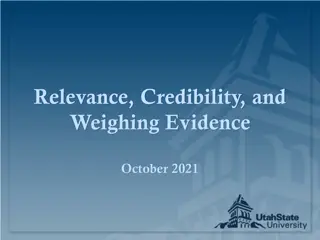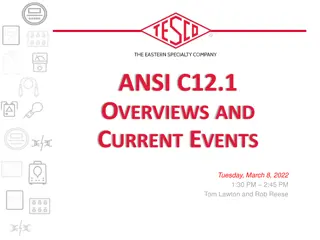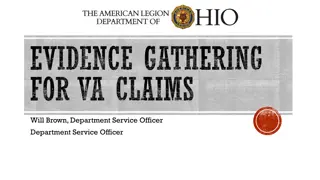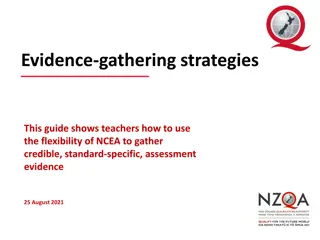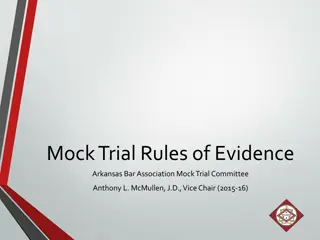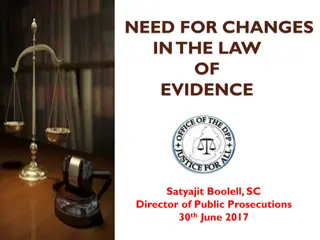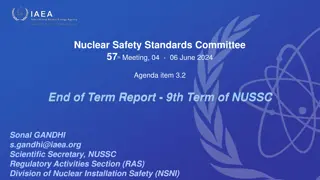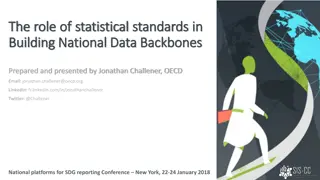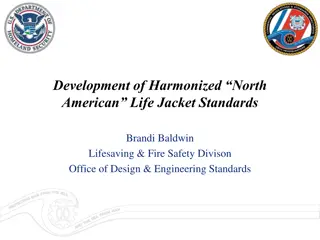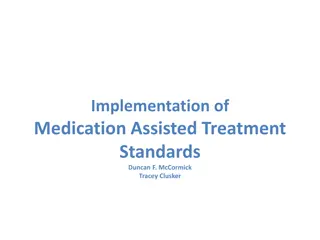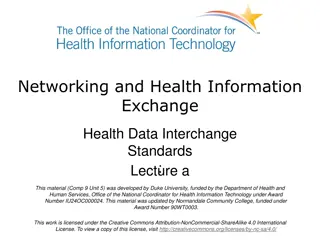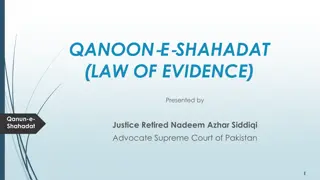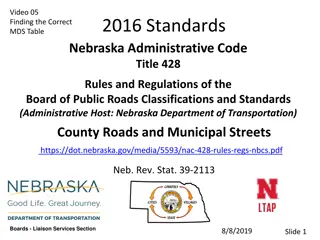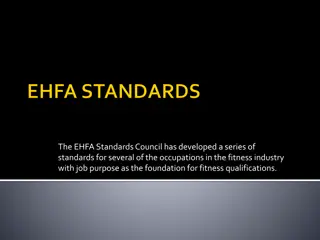Functional Safety and Cyber Security International Standards Update
This update covers various international standards related to functional safety and cyber security, including protocols like CSMA/CD, CSMA/CA, TSN, as well as standards for safety engineering tools and safety modules. It also highlights the collaboration with BSI standards for developing industry st
2 views • 16 slides
Leading National Assessment
Today's mahi involves preparing for the upcoming NCEA Change implementation in 2024. The seminar program covers NCEA Changes, Policies, Readiness planning, Quality Assurance, Corequisites Updates, Pilots & Digital External Assessments. New NZQA Assessment Rules have been published, setting the code
1 views • 37 slides
New Jersey 2023 Student Learning Standards for ELA Overview
The 2023 New Jersey Student Learning Standards for English Language Arts introduce new features, restructuring, and adoption details. These standards aim to prepare students for college, career, and global citizenship by focusing on skills like responsibility for learning, communication adaptation,
1 views • 35 slides
The Role of Artifacts and Evidence in Educator Evaluation and Support
Exploring the role of artifacts and evidence in educator evaluation, this content covers the three categories of evidence required by the Oregon Framework. It delves into the efficient process that reduces redundancy, essential components of SLG goals, and the types of evidence relevant to professio
0 views • 15 slides
Understanding Impression Evidence Collection in CSI Investigations
Impression evidence plays a crucial role in investigations, including shoeprints, tool marks, tire tracks, bite marks, and riffling marks on bullets. This evidence can be collected in 2D using photography or tape lifts, and in 3D through casting methods. Differentiating between class and individual
0 views • 21 slides
Helpful Information About Submitting Evidence to the Crime Lab.
Helpful information about submitting evidence to the Nebraska State Patrol Crime Lab's Evidence Section. Learn about the NSP 750 Evidence Submittal Form, submission process, and guidelines for resubmissions. Ensure all necessary details are provided for proper analysis of evidence.
5 views • 16 slides
Illegally obtained evidence
Illegally obtained evidence refers to evidence acquired through unlawful means, such as searches without warrants or extraction under duress. The Fruit of the Poisonous Tree doctrine renders evidence inadmissible if derived from illegally obtained evidence. The Exclusionary Rule prohibits the use of
2 views • 30 slides
Overview of Internal Audit Standards and Accounting Standards
This content provides an overview of internal audit standards and accounting standards, emphasizing the importance of continuous professional development and updating in the field. It covers various accounting standards, including disclosures, valuation, revenue recognition, and more. Additionally,
5 views • 43 slides
Overview of Human Factors and Automotive Standards YouTube Series
This YouTube series, led by Paul Green from the University of Michigan, covers human factors and automotive standards. It includes topics like introduction to standards, core human factors standards, automotive human factors standards, human-computer interaction standards, and SAE vehicle standards.
7 views • 9 slides
Evidence Room Management
Explore the intricacies of evidence room management in a law enforcement setting, including the roles of individuals like Greg Van Buskirk, differences in crime scene management between large and small departments, the distinction between property and evidence, the importance of maintaining chain of
0 views • 8 slides
Evolution of Accreditation Standards in Library and Information Studies
The shift in standards for accreditation of Master's programs in Library and Information Studies, comparing 2023 to 2015, shows a transition from 6 standards with 13 clauses to 3 standards with 3 clauses. The focus remains on systematic planning, with changes to areas such as Mission and Goals, Proc
0 views • 29 slides
Enhancing Evidence Collection in Education
Explore the importance of minimizing bias in evidence collection, review different types of evidence, identify strategies to collect quality evidence effectively, understand common biases affecting assessment, and learn to spot and address biased statements. Practice eliminating biased language and
0 views • 11 slides
Understanding Evidence in Investigations
Learn about the principles and types of evidence in investigations, including inculpatory and exculpatory evidence, physical, documentary, demonstrative, and verbal evidence. Explore sources of evidence and the significance of collecting relevant information to ensure a fair investigative process.
0 views • 14 slides
Understanding Title IX Investigations and the Role of Evidence Collection
The purpose of a Title IX investigation is to collect relevant evidence, both inculpatory and exculpatory, to allow for impartial decision-making regarding reported sexual harassment cases. Parties involved must receive sufficient notice and have opportunities to participate, present statements, and
1 views • 32 slides
Providing Justified Reasons in Reading Comprehension
Providing justified reasons in reading comprehension involves using evidence from the text to support one's answer, similar to presenting evidence in a legal case. Just as a police officer needs evidence to make an arrest, readers need textual evidence and the word "because" to support their respons
0 views • 11 slides
Understanding Context Evidence in Legal Proceedings
Context evidence in legal proceedings refers to evidence of acts not charged in the indictment, used to provide a background for understanding specific allegations. This type of evidence is often relied upon by the prosecution to explain events or behaviors that may seem isolated or surprising. It i
1 views • 13 slides
Milk and Milk Products: Regulations and Standards in India
The regulations and standards for milk and milk products in India are governed by national bodies such as PFA, AGMARK, BIS, and FSSAI. Legal standards set by the government ensure minimum requirements for quality, composition, hygiene, labeling, and packaging. Quality standards, like BIS and Agmark,
2 views • 36 slides
Delirium Quality Standard in Ontario: Improving Evidence-Based Care
Delirium quality standards in Ontario aim to guide evidence-based care for adults by addressing gaps and variations in care quality. These standards inform clinicians, patients, and organizations on what quality care looks like, incorporating the best available evidence to ensure consistent, high-qu
0 views • 39 slides
Empowering Health Decisions and Care through OHDSI Community Collaboration
OHDSI's mission revolves around improving health by empowering a community to generate evidence that enhances health decisions and care. The journey to real-world evidence involves leveraging patient-level data in source systems and establishing reliable evidence. The OHDSI community is dedicated to
0 views • 5 slides
Understanding Evidence-Based Medicine and Clinical Decision-Making
European Patients Academy on Therapeutic Innovation emphasizes the importance of Evidence-Based Medicine (EBM) in providing optimum clinical care. EBM involves systematic review and utilization of clinical research for informed decision-making, benefiting patients in disease management and treatment
7 views • 20 slides
Tanzania Bureau of Standards: Managing E-Waste with Standards
Tanzania Bureau of Standards (TBS), established in 1975, plays a vital role in formulating and implementing national standards, including those for managing e-waste. Standards ensure quality, safety, and sustainability in materials, products, and services. TBS follows international best practices in
0 views • 22 slides
Optimized Standards for Medical Device Safety and Performance in the EU
This report discusses the importance of harmonized standards in supporting the safety and performance of medical devices in the EU. It highlights the impact of drafting international medical device standards on EU legislation harmonization and emphasizes the role of harmonized standards under the EU
0 views • 8 slides
Understanding Relevance, Credibility, and Weighing Evidence in Decision-Making
Explore the importance of relevance and credibility in evidence assessment, the role of hearing panels in evaluating evidence fairly, and the responsibilities they hold. Learn about presenting relevant evidence, policy analysis, and identifying irrelevant evidence to ensure a thorough review process
6 views • 32 slides
ANSI C12.1 Overview and Current Events
ANSI C12.1 standards are integral to the electric metering industry. The standards, managed by the American National Standards Institute (ANSI) and NEMA, promote voluntary compliance. NEMA plays a crucial role as the secretariat, overseeing committees that propose and review standards every five yea
0 views • 32 slides
Mastering Claims, Evidence, and Warrants for Persuasive Writing
Understanding the concepts of claims, evidence, and warrants is crucial for constructing persuasive arguments. Claims represent positions to persuade, evidence supports claims with facts, and warrants bridge the gap between evidence and claims. An exercise is outlined to help practice forming claims
0 views • 8 slides
Understanding Biased Assimilation and Attitude Polarization in Social Disputes
People with strong opinions on complex social issues tend to interpret evidence in a biased manner, accepting confirming evidence readily while subjecting disconfirming evidence to critical evaluation. This can lead to increased polarization rather than narrowing of disagreement when exposed to the
0 views • 20 slides
Transformation of Quality Assessment Framework in Healthcare
The healthcare quality assessment framework is evolving with a new strategy focused on data-led, people's experiences, care integration, and safety culture. The current framework is transitioning towards a new approach by late 2023, incorporating separate registration and monitoring processes, five
0 views • 14 slides
Understanding Evidence Gathering for VA Claims with The American Legion Department of Ohio
Evidence is crucial for VA claims, and it can come in various forms such as documents, written statements, photos, and video recordings. The framework for evaluating evidence includes factors like relevance, competence, credibility, and weight. Understanding the types of evidence, forms of relevance
0 views • 14 slides
NCEA Evidence-Gathering Strategies for Teachers
This guide explains how teachers can use the flexibility of NCEA to gather credible assessment evidence, tailored to meet student needs. It emphasizes the importance of integrating assessment with learning, producing valid evidence, and ensuring fairness and transparency in assessment practices. Tea
0 views • 19 slides
Understanding Mock Trial Rules of Evidence
Mock Trial Rules of Evidence are crucial for determining the admissibility of testimony and evidence in a trial setting. Students preparing for cases need to assess evidence admissibility, make timely objections, and be prepared to defend testimony. The rules cover objections, specific objections ty
0 views • 36 slides
Need for Changes in the Law of Evidence: Perspectives and Reforms
Information by which facts are proved forms the essence of the law of evidence, regulating how facts are established in courts. This article discusses the exclusionary ethos, statutory reforms, challenges with hearsay evidence, and examples of reforms from different countries like England, Wales, Au
0 views • 18 slides
NUSSC 57th Meeting - End of Term Report & Safety Standards Update
The 57th Meeting of the Nuclear Safety Standards Committee (NUSSC) concluded its 9th term with significant achievements including the approval and publication of multiple safety standards. Key highlights include the development of new standards such as SSG-3, SSG-88, SSG-89, and SSG-90 focusing on v
0 views • 8 slides
Role of Statistical Standards in Building National Data Backbones
The role of statistical standards in constructing national data backbones is crucial for efficient data dissemination and reporting, especially in the context of Sustainable Development Goals (SDGs). Statistical standards guide the orchestration of information flows within a national statistical net
0 views • 22 slides
Development of Harmonized North American Life Jacket Standards
The development of harmonized North American life jacket standards led by Brandi Baldwin in the Lifesaving & Fire Safety Division at the Office of Design & Engineering Standards is a crucial regulatory process. It involves regulatory progress, standards development, consensus processes, and ongoing
0 views • 16 slides
Practice and Procedure in Judicial Review: Factual Evidence and Interveners
The content provides valuable insights into the practice and procedure regarding factual evidence and interveners in judicial review cases. It covers general rules, recent cases, applications for oral evidence, questioning witnesses, opinion evidence, and the role of interveners. Key points include
0 views • 28 slides
Implementation of Medication Assisted Treatment Standards and Phases to Evidence Implementation
The Medication Assisted Treatment (MAT) Implementation Support Team (MIST) aims to enhance local teams' capacity to implement MAT standards through various methods including clinical QI, evidence collection, information governance, and leadership. The evidence implementation involves three phases: s
0 views • 6 slides
Health Data Interchange Standards Overview
Explore the importance of data standards in healthcare, including HL7 standards, core requirements for data exchange, and choices for data interchange. Learn about HL7 v2 and v3 messaging standards, document standards, and the benefits of using HL7 v2 messaging standard. Understand why data intercha
0 views • 28 slides
Understanding Qanun-e-Shahadat: Law of Evidence in Pakistan
Qanun-e-Shahadat Order 1984 replaced the Evidence Act of 1872 in Pakistan, aiming to align the law of evidence with Islamic principles. This law is crucial for judicial proceedings, governing the admissibility of oral and documentary evidence, primary and secondary evidence, and resolving conflicts
0 views • 22 slides
Understanding Nebraska's Road Design Standards
Explore the Nebraska Administrative Code Title 428, which outlines the standards and regulations for public roads in Nebraska, including county roads and municipal streets. Learn about terminology, acronyms, and design tables to find the appropriate standards for road and street work. Discover the p
0 views • 51 slides
EHFA Standards in the Fitness Industry
The EHFA Standards Council has developed a series of standards for fitness occupations, focusing on job purpose as the foundation for qualifications. EHFA provides guidance on standards for people, programs, and places in the health and fitness sector. Since 2003, EHFA has been setting standards for
0 views • 19 slides

